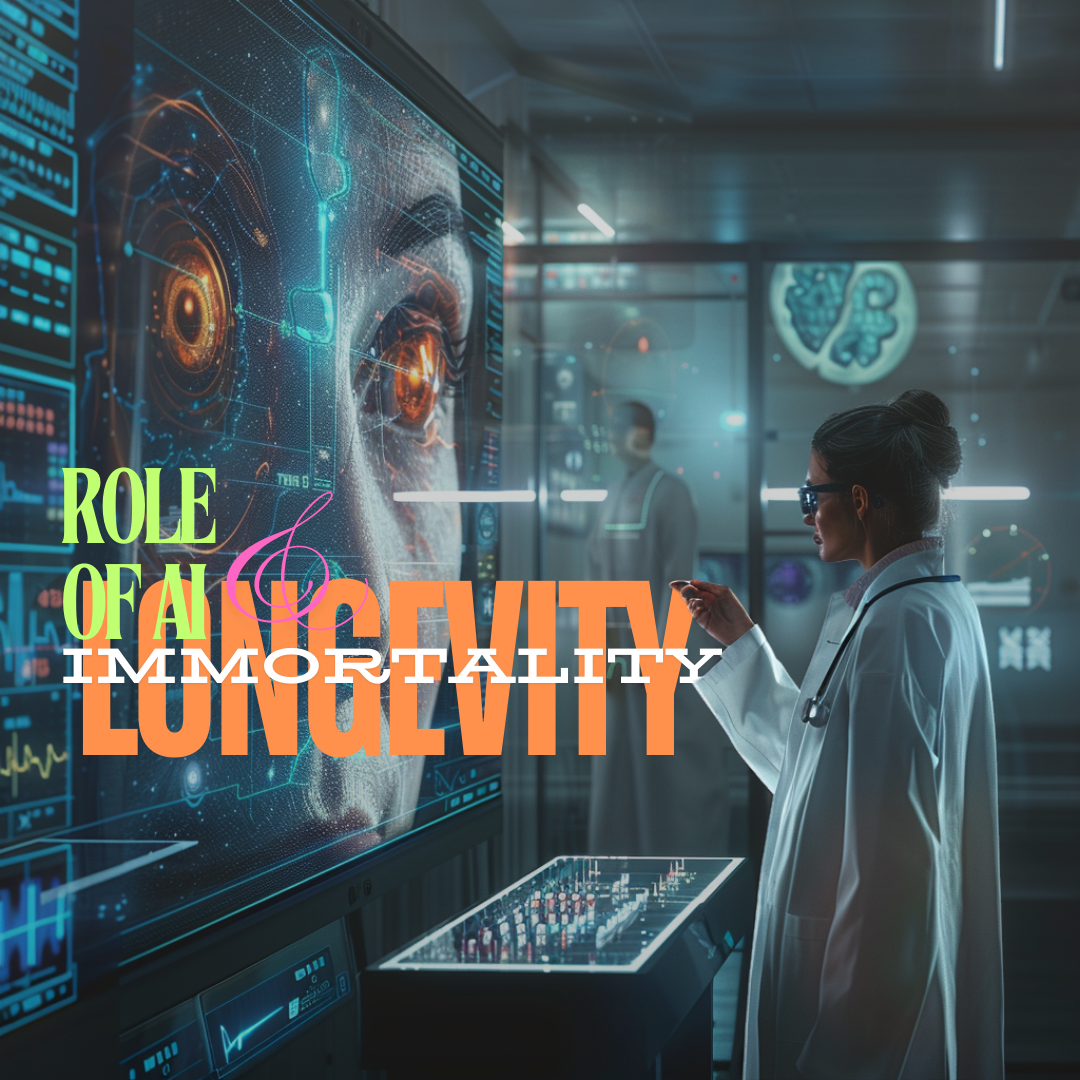
AI: Revolutionizing Health Diagnostics for a Healthier Future and Longevity
Artificial intelligence (AI) is revolutionizing healthcare diagnostics, paving the way for a future of personalized medicine and potentially extended lifespans. This exciting field is tackling age-related challenges from multiple angles. AI-powered tools like FLIO offer early detection of eye diseases, while omics data analysis provides a comprehensive view of an individual's health for precision treatment plans. These advancements, along with AI's role in drug discovery, promise a future where aging is met with innovative care and potentially a longer, healthier life.
Immortality and Longevity:
Humans have always been obsessed with the idea of immortality and the desire to live longer. Throughout history, this quest for longevity has driven countless myths, legends, and scientific pursuits. From the ancient alchemists' search for the elixir of life to modern advancements in biotechnology, the aspiration to extend human lifespan reflects a deep-rooted passion that transcends cultures and eras.
This fascination with longevity is not merely about the fear of death but also about the desire to enhance the quality of life. People yearn for more time to explore the world, achieve personal goals, and spend precious moments with loved ones. The pursuit of longevity encompasses a broader vision of human potential, pushing the boundaries of what we believe is possible in terms of health and well-being.
In recent times, the focus has shifted towards understanding the biological mechanisms of aging and finding ways to slow down or reverse its effects. Advances in genetics, regenerative medicine, and AI-driven diagnostics are paving the way for groundbreaking treatments that could significantly extend healthy lifespans. This ongoing journey towards longevity continues to inspire and challenge humanity, driving innovation and fostering a deeper understanding of what it means to live a full and meaningful life.
The Secrets of Aging Eyes: A Deeper Look at FLIO
Imagine a revolutionary tool that can peer into the depths of your eyes, not just to see, but to understand their health at a cellular level. This is the power of Fluorescence Lifetime Imaging (FLIO), a cutting-edge technology that's transforming how we diagnose and treat age-related eye diseases.
FLIO goes beyond the typical eye exam. Instead of simply looking for physical changes, it measures the very essence of how light interacts with the retina, the light-sensitive layer at the back of your eye. Think of it like a high-tech version of those glow-in-the-dark toys: FLIO tracks how long these tiny "excited molecules" in your retina take to calm down after being zapped with light.
Here's the magic: the "lifetime" of this fluorescence, as scientists call it, changes depending on the health of your retinal tissue. FLIO captures these subtle variations, creating a detailed map of your retinal health. This allows doctors to spot abnormalities long before they cause any noticeable problems or irreversible damage.
This early detection is crucial for age-related eye conditions like macular degeneration, which steals vision, and diabetic retinopathy, a complication of diabetes. By catching these diseases early, doctors can take steps to slow or even prevent vision loss.
But FLIO's potential goes beyond just diagnosis. It's a testament to a larger trend in healthcare: the powerful marriage of AI and advanced imaging. FLIO's rich data can be analyzed by AI algorithms, uncovering hidden patterns and connections that human eyes might miss. This not only improves the accuracy of diagnoses but also paves the way for personalized treatment plans. By combining FLIO with other tools and patient information, healthcare providers can create a more comprehensive picture of your eye health, leading to more effective treatment strategies for age-related conditions.
FLIO is a shining example of how technology is reshaping medicine, offering a glimpse into a future where aging doesn't have to mean losing your sight. It's a future where we can not only see the world around us, but also see deep within ourselves to ensure a lifetime of healthy vision.
AI Unlocking the Secrets Within: A Deeper Look at Omics Data Analysis
Traditionally, healthcare analysis has relied on looking at individual pieces of a puzzle – a blood test here, a genetic test there. But what if we could see the entire picture at once? This is where AI and omics data analysis come in,fundamentally changing how we understand and treat age-related conditions.
Omics data is a treasure trove of information encompassing a person's genes (genomics), proteins (proteomics), and even their metabolic profile (metabolomics). It's like having a detailed blueprint of an individual's health. AI excels at sifting through this massive and complex dataset, finding connections and patterns that would be impossible for humans to discern on their own.
This shift from isolated data points to a holistic view marks a turning point in healthcare. Imagine AI in genomics identifying specific gene variations that make someone more susceptible to age-related diseases like Alzheimer's. In proteomics, AI can analyze protein activity, revealing the inner workings of a disease. Metabolomics, which studies the body's chemical processes, benefits from AI's ability to detect subtle imbalances that might signal the early stages of diabetes or heart disease.
This comprehensive approach is a game-changer for precision medicine. By combining insights from all three omics fields, AI can generate a personalized health profile for each individual. Think of it as a roadmap for customized treatment plans. For instance, in cancer treatment, AI can analyze the tumor's unique genetic and molecular makeup to identify the most effective therapies. Similarly, for managing metabolic disorders, AI can recommend lifestyle changes or medications tailored to the individual's specific metabolic pathways. This level of personalization not only increases treatment effectiveness but also reduces side effects and leads to better overall outcomes.
The beauty of AI is that it's constantly learning and improving. As more data is fed into the system, AI models become more precise and predictive, further enhancing their value in precision medicine. This dynamic nature ensures healthcare providers have access to the latest and most accurate information, allowing them to take a proactive approach to preventive care. AI isn't just a data analysis tool; it's a catalyst for a more personalized, efficient, and effective healthcare system – a critical advantage when tackling the complexities of age-related conditions.
The future of drug discovery is also being shaped by AI. By analyzing vast amounts of data and simulating countless scenarios, AI can rapidly identify promising drug candidates. This not only saves time and money compared to traditional methods, but also deepens our understanding of complex diseases. Ultimately, this paves the way for developing personalized treatments that improve the quality of life for our aging population.
The marriage of AI and healthcare isn't just about technology; it's about building a future where aging is approached with innovative, effective, and compassionate care.
#HealthcareTomorrow #AIinMedicine #PrecisionHealth #FutureOfDiagnostics



